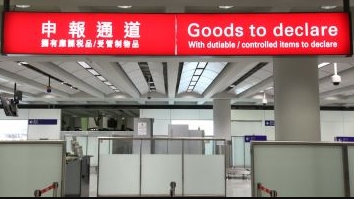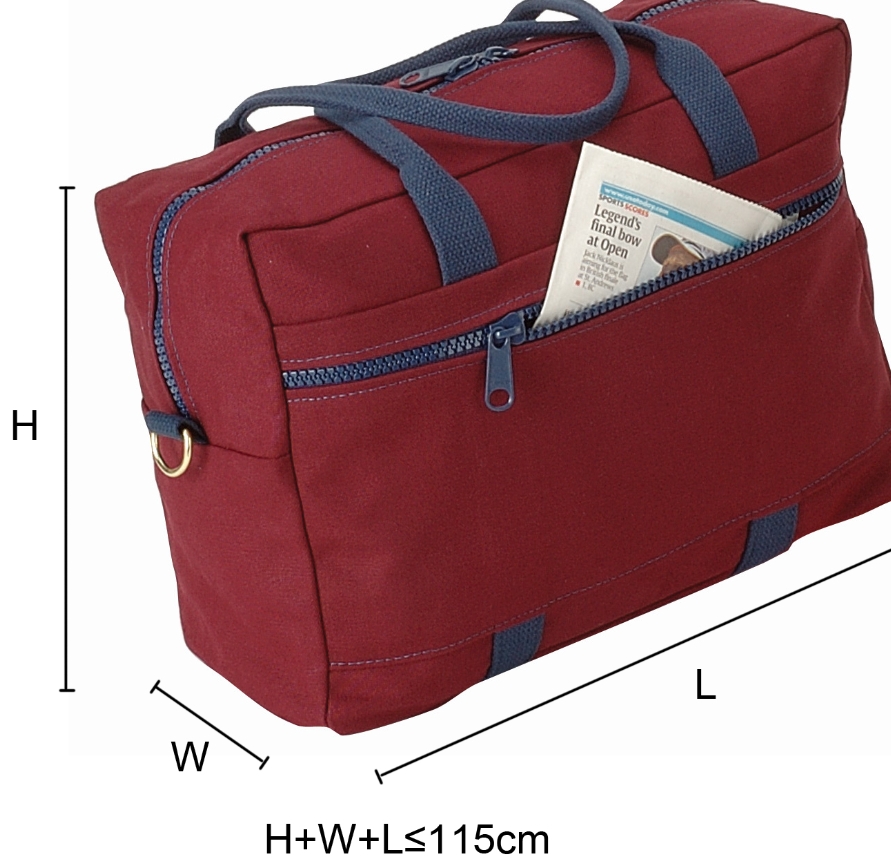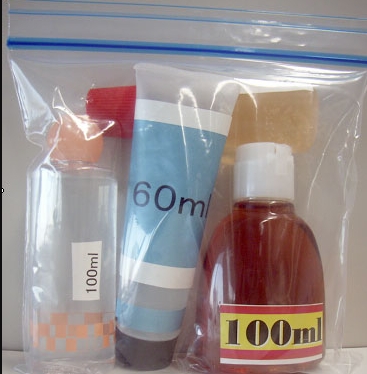When enter into China, people need to go through three procedures normally: Choose Channels – Customs Declaration – Customs Examination
Choose Channels
When inward passengers enter into China, if you haven’t brought anything which needs to be declared, choose the “Nothing to Declare Channel” (Green Channel), and if you have anything need to be declared to the customs with you, choose the “Goods to Declare Channel”(Red Channel). Personal articles which are within the limitation set by the Customs are exempted from duty. For those who are not certain about the Custom Regulation can ask the Customs officers for details or just choose the “Goods to Declare Channel” (Red Channel).

Customs Declaration
Inward passengers carrying the following articles shall choose the “Goods to Declare Channel”.
1.Personal articles which are valued at RMB 2,000 or above.
2.Alcoholic drinks of 1500ml or above (containing 12% or above alcoholic content); cigarettes of 400 sticks or above; cigars of 100 sticks or above; tobacco of 500g or above.
3.RMB 20,000 cash or above, or any other foreign currencies in cash equivalent to US $5,000 or above.
4.Animals, plants, animal and plant products, microbes, biological products, human tissues, blood and blood products.
5.Radio transmitters, radio receivers, communication security equipment.
6.Goods of commercial value, samples, advertisements.
7.Unaccompanied baggage.
8.Other articles which are prohibited or restricted from being brought into the territory regulated by the law of China.
Note:
(1). Personal articles shall be limited to PERSONAL USE only and subject to RESONALBLE QUANTITY control. “Personal Use” means private use or as gifts to relatives or friends, but not for selling or lending. “Reasonable Quantity” means the normal quantities based on the travel purpose and the length of residing time.
(2). For No.1 and No.2 clause of above, the exceeding part or amount above the limitation set by the Customs shall be levied duty upon. (subject to reasonable personal use).
(3). For No.3 clause of above, inward passengers who fail to observe the regulation will face administrative penalty fine or even get their currencies confiscated. The limit of RMB allowed to bring in China is 20,000 yuan, and the exceeding part is prohibited. For the foreign exchange, there are no quantitative restrictions. However, if carrying foreign currencies in cash worth more than 5,000 US dollars, inward passengers shall declare to the Customs accurately. And the Customs will release it to the passengers on the departure upon the declaration made at the last entry.
(4). The items in the No.4, 5, 6, 7 and 8 clause of above will be dealt in accordance to the current regulations.
Customs Examination
The Customs will examine the personal articles carried by inward passengers and verify whether the Declaration Form is accurate or not, and if there are any prohibited goods. Then, according to the examination results and related regulations, the Customs will determine the levy, duty free, detention, withdrawal or release of the baggage.
Prohibited and Restricted Articles
In accordance with the law, the following articles are prohibited to bring into China.
1.Arms, simulation arms, ammunition and explosives of all kinds.
2.Counterfeited currencies and counterfeited negotiable securities.
3. Printing materials, films, photographs, records, cinematographic films, audio tapes, video tapes, laser disc, computer storage media and other articles which are detrimental to the political, economic, cultural and moral interests of China.
4.Deadly poison of all kinds.
5.Opium, morphine, heroin, marihuana and other narcotics and psychoactive drugs which cause addiction.
6.Fresh fruit, solanaceous vegetables, live animals (except dogs and cats), animal products, pathogens of animals and plants, pests and other harmful organism, carcasses, soil, transgenic organism materials, relevant animals and plants, their products and other objects from countries or regions with prevalent epidemic animal or plant diseases.
7.Foodstuff, medicine and other articles coming from epidemic stricken area or harmful to man and livestock or those which might spread disease.
Food, medicine or other articles which are harmful to the health of man and livestock, or coming from epidemic stricken area or spreading disease.
In accordance with the law, the following articles are restricted to bring into China.
1.Radio transceiver and communication security machines
2.Alcohol and tobacco
3.Endangered and rare animals, plants (including animal and plant specimen) and their seeds and propagation materials.
4.National currencies
5.Other articles restricted by the Customs
Related Tax Regulations
The imported articles which are limited to regulated quantity and only for personal use are duty free. For the imported self-use articles which excess the regulated quantity, however are limited to reasonable quantity, the owner shall pay import duty for the articles before releasing the imported articles. If the imported articles excess the reasonable self-use quantity, the articles will be taken as imported goods and related formalities shall be followed.
Table of Import Tax Rates on Personal Luggage of Passengers and Personal Postal Parcels
| Tax File Number | Tax Rate(%) | Article Name |
| 1 | 10 | books & papers, publications, movie films specially designed for education, slides, master piece tapes, videotapes, gold and silver and their products, computer, video camera, digital camera, camera, foods, beverages, and other products which are not included in No.2, 3 and 4 items of this table. |
| 2 | 20 | textile and its products, television camera and other electrical appliances, bicycles, wrist watches, horologes(including parts and accessories) |
| 3 | 30 | golf ball and golf clubs, luxury watches |
| 4 | 50 | cigarette, alcohol and cosmetics |
Important Notice:
1.In the Customs control area of entry and exit ports, cellphone, camera, video camera and video equipment shall not be used.
2.Printing Materials & Audiovisual Products
Printing materials less than 10 piece and audiovisual products less than 20 plates are free of duty each time for one passenger.
3.Cigarette & Alcohol
Except the above regulation of cigarette and alcohol, passengers under 16 are not allowed to bring cigarette and alcohol with them.
4.Pet Dog & Pet Cat
One passenger can only bring one pet dog or pet cat to China.
Passengers with pet dog or pet cat shall make declaration to the Customs when they enter into China. After receiving the declaration, the Customs will verify related quarantine certificate and rabies vaccination certificate issued by the official organization of exporting country (or region), then inform the port Animal and Plant Quarantine Agency and put the pet dog or pet cat into quarantine. The agency will issue an quarantine certificate to the passenger and the validity of the certificate is 30 days.
If passengers can’t provide the official quarantine certificate and rabies vaccination certificate issued by the official organization of the exporting county (or region) of their pet dog or pet cat, or one passenger bring more than one pet dog or pet cat, the Customs will inform the port Animal and Plant Quarantine Agency to temporarily detain the relaved pet dog or pet cat.
About Baggage Allowance for Entry & Exit China
Different airlines have slight differences in the regulation of baggage allowance, and there are also difference between the domestic flight and international flight. The following content is the general condition of the baggage allowance in China. Travelers are recommended to check the detailed information on the official websites of the airlines.
There are two kinds of baggage: carry-on baggage and checked baggage. Carry-on baggage refer to the baggage you are allowed to take with you onto the airplane, and if you have more baggage or for those articles which are prohibited to carry in the carry-on baggage, you can consign those baggage to the carrier and pick them up at the destination, those baggage are called checked baggage.
Carry-on Baggage
Size
Domestic Flight: in general condition, the total weight shall not be over 5kg, and the sum of the length, width and height of the baggage shall not be over 115cm (45in). First class passenger may carry two pieces of carry-on baggage, while passengers in business class and economy class are only allowed to carry one piece of carry-on baggage.
International Flight: in general condition, the total weight shall not be over 7kg, and the sum of the length, width and height of the baggage shall not be over 115cm (45in). American-Canada route only allows passenger to carry one piece of carry-on baggage.
Note: The requirements may be different for different airlines, please check details on the airlines website; any item in excess of the weight, number or size will be handled as checked baggage.

Regulation for Lithium Battery
If the passenger carries any spare batteries for mobile phone, laptop, camera and other equipment for personal use, then the electric equipment can be put in the checked baggage or carry-on baggage, however, the spare batteries can be only put in the carry-on baggage. The lithium batteries for mobile phone, laptop, camera and other equipment shall be put only in the carry-on baggage on the flight. During the flight, the equipment with lithium battery shall be powered off. The carried lithium battery shall be protected properly and be packed independently to avoid combustion and explosion caused by friction and short circuit.
If the rated energy of the lithium battery is lower than 100wh, every passenger can bring 2 pieces at most, and there is no need to declare the battery to the airlines.
If the rated energy of the lithium battery is higher than 100wh and lower than 160wh, every passenger can bring 2 pieces at most, and the battery should be declared to the airline and approved by it before boarding.
If the rated energy is equal or higher than 160wh, the battery should be declared to the airline and consulted for freight service.
Note: Rated Energy (wh) = Battery Capacity (Ah) × Normal Voltage (V)
Regulation for Liquids
1.Items of liquids, gels and aerosols shall be stored in containers with maximum capacity of 100ml, and if the containers are larger than 100ml, they are not allowed to put in the carry-on baggage but only in the checked baggage.
2.The containers with liquids shall be put into and sealed in a transparent plastic bag with maximum capacity of 1L. Each passenger can only bring one transparent plastic bag and the exceeding part shall be transferred as checked baggage.
3.Plastic bag with liquids will be checked separately at the security checkpoint; if the passenger need to carry infant formula/milk/breast milk (need to have a baby in accompany) and other liquid drugs for diabetes or other disease, he shall present the certification to the security staff and those articles need to pass the security checkpoint. Liquid drug shall be put into the containers of 100ml capacity and then sealed into a transparent plastic bag.
4.Liquids bought at the isolated area of the airport terminal can be carried on the plane.

Checked Baggage
Free Checked Size
Domestic Flight: normally, first class passengers who buy adult and children ticket have 40kg checked baggage for free; business class passengers can bring 30kg free checked baggage and economy class can only bring 20kg free checked baggage.
International Flight: normally, passenger from economy class can bring 20kg checked baggage for free, while passenger holding student passport can bring 30kg checked baggage for free; business class is 30kg while first class is 40kg. However, if the plane is flying to America countries, then each passenger can bring two pieces of checked baggage, and each baggage for first class and business class shall be no more than 32kg, and economy class shall be no more than 23kg. The sum of the length, width and height of the baggage shall not be over 158cm. If the passenger’s baggage exceeds the free baggage allowance, the passenger needs to pay for the excess baggage.

Note:
1. Some low-cost airlines, like AirAsia will not offer free checked baggage service, and passengers need to pay for the checked baggage. Different airlines may have different regulations, please check this out when you book the ticket.
2. In most condition, infant passengers have no free baggage allowance; however, the parents may bring one stroller for free.
3. Pet dog or pet cat can be brought with the traveler to the plane, however, passenger need to have related health certificate of the pet animals. The pet animals will be put into the cargo space, so fi the pet animals are not suitable to put there will not be accepted. The cages of the pet animals shall be well ventilated and tied in case of the escape of the animals.
Unsuitable Items for Checked Baggage
The following items are not suitable to put into the checked baggage, and passenger can put them into the carry-on baggage. They are: fragile or vulnerable goods; perishable goods; cashes and marketable tickets; jewelry; precious metals (gold and silver) and its products; antique calligraphy and painting; computer and personal electronic device; samples and other valuables; spare lithium batteries; important documents and materials; travel documents, medical certificate and X-ray picture; prescription medicines need to be taken regularly by the individuals.
Smart Ways to Deal with Excess Baggage
Sometimes, excess baggage will cost a fortune, and the charge fees may be even more valuable than the baggage itself. So to know how to deal with the excess baggage to save more money is very important for passengers.
First, when choose a flight, besides the flight time and ticket price, passenger can also take the charge for excess baggage into consideration. For international flight, exchange rate should also be considered for foreign airlines and Chinese airlines use different currencies to charge.
Second, join in the membership of the airlines. Members of the airlines often have a privilege in the free baggage allowance, and many airlines will allow its members to bring one more free baggage than other passengers.
Third, if you are sure your baggage is excessing the free baggage allowance, then book the baggage limit online in advance will enjoy discount from the airlines. Sometimes, passenger can enjoy a 20% discount.
Fourth, if your baggage is too heavy and the price for the excess baggage is more expensive than the baggage itself, then it’s better to mail the baggage at the nearest post office.
Last, pay attention to the latest promotions of the airlines. Some airlines will improve its free baggage allowance for a certain group from now and then. Knowing this kind of information in advance from the website of the airlines may save you a lot of money for the excess baggage.
Prohibition and Limitation of the Baggage
Articles Prohibited to Transport
1.Dangerous articles, including: explosives; gas (including flammable gas, toxic gas, nonflammable toxic gas); flammable liquids; flammable solid, spontaneously combustible substances and substances which will release flammable gas in contact with water; oxidizing agent and organic peroxides; toxic substances and infectious substances; radioactive substances; corrosive substances; magnetic substances and other dangerous substances regulated by China.
Note: lighters and matches are also prohibited to take on the plane in China.
2.Guns (including various imitation guns, gun shape lighters, attacking weapons, besides guns for sports); ammunition; military & police firearms; controlled knives.
3.Living animals, except for the little animals and service that satisfy the requirements.
Articles Limited to Transport
1.Electric appliances and precise instruments shall be checked as goods; if they are checked as baggage, their weights are not included in the free baggage allowance and shall be packed properly.
2.Sports equipment, including sports guns and ammunitions.
3.Dry ice, alcoholic drinks, and smoking sets, medicines and cosmetics which are needed by the passengers during the travel.
4.Diplomatic pouches and confidential documents.
5.Edged tools and blunt except controlled knives, such as kitchen knife, fruit knife, craft knife, scissors, steel file, ax, hammer, etc. shall be put into the checked baggage.
6.Little animals and service dogs which satisfy the requirements.
7.Folding wheelchair or electronic powered wheelchair used in the travel by the passenger.
8.Liquids carried along with the passenger.
9.Articles which are not suitable to transport in the cargo space of the aircraft (like delicate instruments) and don’t satisfy the relevant regulations (like weight and size) shall be taken into the passenger cabin as CBBG. This kind of articles will be charged additionally and shall be kept by the passengers themselves.